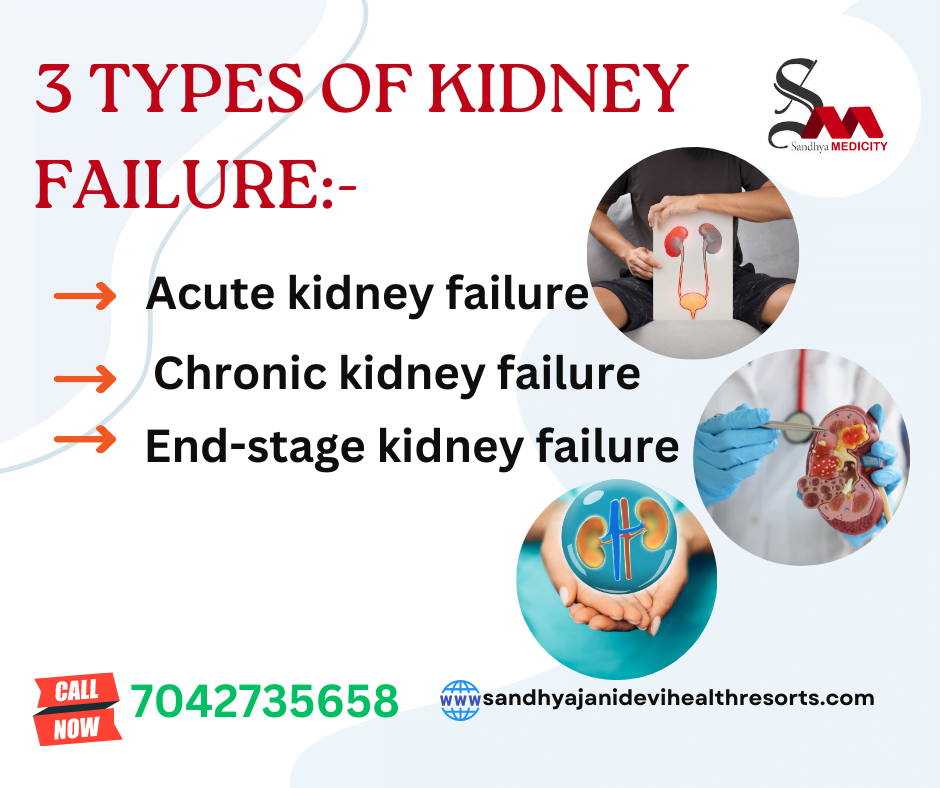kidney failure. Kidney failure is a condition where the kidneys fail to perform their essential functions, resulting in a build-up of waste products and toxins in the body. When the kidneys fail to function properly, the normal balance of fluids and chemicals in the body is disturbed. We will learn about the three types of kidney failure and their symptoms, causes, and treatment.

Type 1: acute kidney failure
The first type of kidney failure is acute kidney failure. It is also known as acute renal failure. Acute kidney failure occurs when the kidneys suddenly stop working or lose their function over a short period of time. Acute kidney failure can be life-threatening because it can rapidly build up waste products and alter the balance of fluids and electrolytes in the blood.
Acute kidney failure has many causes, but is mainly caused by a problem with blood flow to the kidney, damage to the kidney, or a blockage in the urinary tract. Common causes include severe infection, dehydration, kidney stones, medications and drugs such as NSAIDs or antibiotics.
Symptoms of acute kidney failure include decreased urine output, swelling of the feet, ankles, or legs, fatigue, nausea, vomiting, and confusion. Advanced symptoms may include seizures or coma due to the accumulation of toxins in the body.
Treatment of acute kidney failure usually requires hospitalization. Treatment options include medication to treat the underlying condition, intravenous fluids to help the kidneys function, and dialysis, which is the process of filtering waste products from the blood when the kidneys are not working.
Type 2: Chronic kidney failure
Another type of kidney failure is chronic kidney failure. Chronic kidney failure occurs when the kidneys gradually lose their function over time. Chronic kidney failure is a long-term condition that can happen to anyone, but it is more common in people who have diabetes or high blood pressure.
Chronic kidney failure is usually caused by medical conditions that affect the long-term health of the kidneys, such as diabetes, high blood pressure, glomerulonephritis, and polycystic kidney disease. Risk factors for developing chronic kidney failure include a family history of the condition, being overweight or obese, and smoking.
Symptoms of chronic kidney failure may not appear until the disease has progressed significantly. Common symptoms include fatigue, difficulty concentrating, loss of appetite, swollen feet or ankles, and frequent urination, especially at night.
Unfortunately, there is no cure for chronic kidney failure. Treatment options include management of underlying medical conditions and lifestyle changes, such as a low-sodium diet, regular exercise, and avoiding smoking. In advanced cases of chronic kidney failure, dialysis and a kidney transplant may be necessary.
Error: Contact form not found.
Type 3: End-stage kidney failure
The third and final type of kidney failure is end-stage kidney failure. End-stage kidney failure is the final stage of chronic kidney failure, where kidney function has declined to the point where dialysis or a kidney transplant is necessary for survival.
The causes of end-stage kidney failure are similar to those of chronic kidney failure, with diabetes and high blood pressure being the main causes. However, other factors may contribute to a decline in kidney function, such as urinary tract obstruction, infection, and certain medications.
The symptoms of end-stage kidney failure are similar to those of chronic kidney failure, but they can be more severe. In addition to fatigue, loss of appetite, and swelling in the legs or feet, patients may also experience significant weight loss, decreased mental function, and muscle weakness.
Treatment of end-stage kidney failure usually requires dialysis or a kidney transplant. Dialysis is a filtering process that cleans the blood when the kidneys stop working. Kidney transplant is a surgical procedure that replaces a failing kidney with a healthy donor kidney.
Conclusion
Kidney failure is a serious medical condition that requires proper diagnosis, monitoring, and treatment. Acute kidney failure, chronic kidney failure, and end-stage kidney failure are three types of kidney failure that differ in their causes, symptoms, and treatment options.
If you suspect you may have symptoms of kidney failure, such as decreased urination, swollen legs or fatigue, we recommend seeking medical attention immediately. Kidney failure is curable if detected early, so don’t hesitate to seek help.


